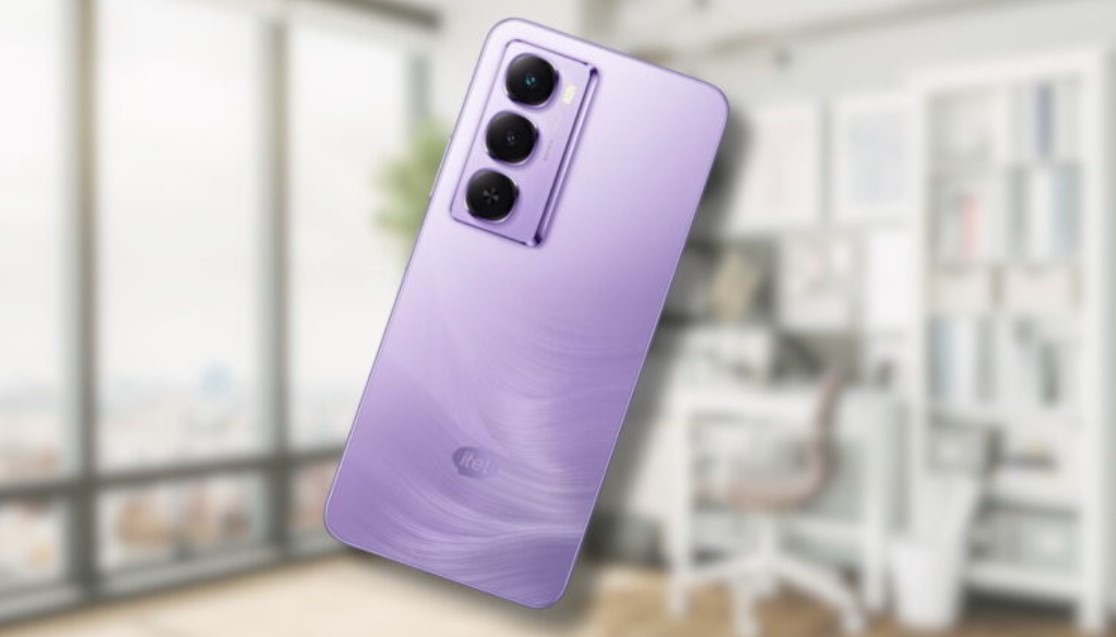itel has launched the City 100 smartphone in India, expanding its budget segment with a surprisingly feature-rich device. Priced at just ₹7,599, it’s got a sleek profile, a decent display, AI smarts, and a few unexpected perks.
The entry-level phone landscape is crowded, but the City 100 stands out thanks to a 7.65mm unibody design, IP64 water and dust resistance, and Android 14 support straight out of the box.
A Budget Phone That Doesn’t Look or Feel Cheap
itel’s City 100 doesn’t scream budget at first glance. At 7.65mm, it’s thinner than most phones in its price bracket.
In fact, it’s thinner than some flagships.
It sports a premium-looking unibody with a matte finish and rounded edges. The IP64 rating isn’t waterproof, but it’ll handle accidental splashes or dust in your pocket — handy for everyday users, especially in India’s monsoon or dusty environments.
There’s also a bit of flair with three color options: Fairy Purple, Navy Blue, and Pure Titanium. Each brings a different vibe. The in-hand feel? Not bad for a sub-8K phone.

Display Surprises and the New “Dynamic Bar”
The 6.75-inch HD+ IPS screen won’t win awards, but it punches above its weight.
You get a 90Hz refresh rate, 700 nits peak brightness, and decent color coverage (83% NTSC). In real use, that means smoother scrolling and enough visibility even under sunlight.
The fun part? The phone features a “Dynamic Bar 2.0” — which works a bit like a toned-down version of Apple’s Dynamic Island. It gives:
Face unlock cues
Battery alerts
Call notifications
It’s simple but effective. No gimmicks, just basic visual feedback at a glance. Again, surprising to see this in a phone under ₹8,000.
Performance and Specs: Far From Barebones
Now, let’s talk specs. The itel City 100 runs on the Unisoc T7250 octa-core processor — a relatively new mid-range chip designed to balance performance and battery life.
Out of the box, you get 4GB RAM and 128GB internal storage. But here’s where itel plays smart: RAM can be expanded virtually to 12GB through dynamic memory sharing. That makes multitasking smoother.
Battery life? Solid. The 5,200mAh cell should last most users a full day and then some. Add 18W fast charging over USB-C and you’re back up quickly.
| Feature | Details |
|---|---|
| Processor | Unisoc T7250 Octa-core |
| RAM | 4GB (expandable to 12GB with virtual RAM) |
| Storage | 128GB |
| Battery | 5,200mAh with 18W Fast Charging (USB-C) |
| Display | 6.75″ HD+ 90Hz, 700 nits |
| Protection | IP64-rated Dust & Splash Resistant |
Cameras are modest, as you’d expect — 13MP rear and 8MP front.
That’s good enough for everyday photos and video calls, but you won’t be capturing National Geographic covers. That said, image clarity in daylight was decent, and the selfie cam does a fine job for video chats.
Connectivity’s been beefed up with dual-band Wi-Fi (both 2.4GHz and 5GHz) and an IR blaster, which can turn the phone into a remote — always a bonus.
And then there’s Aivana 3.0 — itel’s AI assistant. It supports some genuinely useful tools:
Text extraction with two fingers
Auto-generating Word, PDF, or Excel files from images
AI-assisted writing and editing tools
Smart scanning and email-based address navigation
Not all of it is perfect, but it works more often than not. Students and first-time users will especially find the document conversion and AI writing assist quite handy.
Long-Term Promise: 60 Months of Smooth Use?
itel’s marketing makes a bold promise — “up to 60 months of smooth usage.”
That’s five years. Realistically? Expect decent performance for maybe 2–3 years. But that’s still respectable for this price range.
And itel is backing that with confidence — they’re offering 100-day free screen replacement, and throwing in a limited-time magnetic speaker worth ₹2,999.
That kind of value proposition is rare. It’s clearly aimed at luring in young users, students, and first-time buyers who might hesitate on spending more for mid-range phones.
The side fingerprint sensor also adds a touch of ease. It’s fast enough and doubles as a power button — minimal learning curve.
Market Positioning and CEO’s Take
With the City 100, itel is taking direct aim at Xiaomi’s Redmi A series, Samsung’s M-series budget phones, and Realme’s entry-level devices.
While it lacks brand prestige, it’s carving out a space with smart features and longer usage claims.
Arijeet Talapatra, CEO of itel India, had this to say during the launch:
“Durability is the foundation of any reliable product. The ability to last long is what sets a good device apart from its competition.”
He also highlighted the brand’s move towards slimmer, more premium designs and smarter AI integration through Aivana 3.0.
The Indian smartphone market is fiercely competitive. But phones like City 100 show that itel isn’t here to play safe. It wants a real slice of the sub-₹10,000 pie — and it’s bringing value, not gimmicks.



















